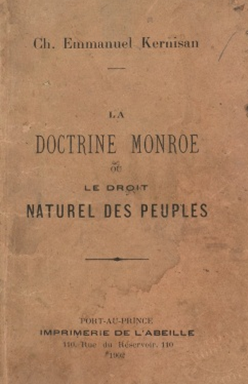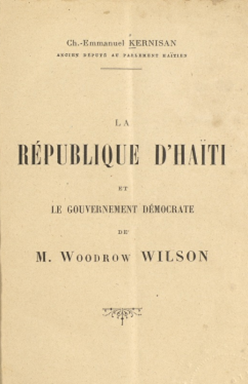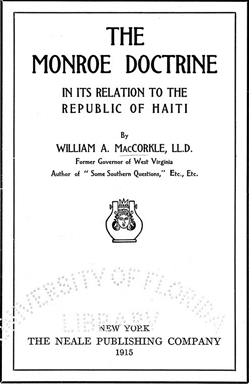"American Apprehension" by Dana Munro (1906-1981)
An excerpt from Munro’s Intervention and Dollar Diplomacy in the Caribbean, 1900-1921 (1964). Munro was an American diplomat who served in Haiti, Nicaragua, and Chili. He later went on to teach history at Princeton University.
The basic idea that inspired the Caribbean policy of the United States in the first two decades of the twentieth century was Theodore Roosevelt’s corollary to the Monroe Doctrine: that the United States, if it wished to prevent European intervention, must help the Caribbean republics to do away with the chronic disorder and financial mismanagement that invited intervention. This idea was not wholly new, for several statesmen and writers in Europe and in the United States had suggested that the United States could not maintain the Monroe Doctrine without assuming some responsibility for the conduct of the states protected by it. The Corollary itself was foreshadowed by the Platt Amendment, which sought to make sure that Cuba’s independence was not imperiled by inability to protect foreigners and to pay debts. Cuba however, was an exceptional case. It was not until after the Anglo-German blockade of Venezuela in 1902-1903 that the Corollary became a part of the American government’s general policy in the Caribbean.



French and German interests were still more powerful in Haiti than in any other Caribbean state. The French were the republic’s chief creditors and the best customers for its exports, and the National Bank, in which the French had an equal voice with the American directors, was constantly involved in politics because the government had to have its help in meeting the budget. Germans owned the most important public utilities, and German steamship lines carried most of the country’s trade. The local German merchants had much political influence because it was they who usually financed revolutions. The State Department’s concern about these European activities was the greater because the French and German governments manifested a rather special interest in Haitian affairs and resisted the efforts of the United States to increase its own influence.
Germany was suspected especially of wanting to obtain a naval base or a coaling station in Haiti. Since her navy, without such facilities, was at a disadvantage as compared with those of powers that had colonies in the Caribbean, this desire was not unreasonable, but the naval authorities in Washington thought that any large supply of coal, anywhere in the West Indies, might be dangerous to the United States. The State Department in 1910 and 1912 had opposed efforts by French and German steamship lines to obtain concessions for coaling depots in Haiti, and it was of course especially sensitive to any project that seemed to involve the Mole St. Nicolas. Rumors and reports of such projects caused uneasiness from time to time.